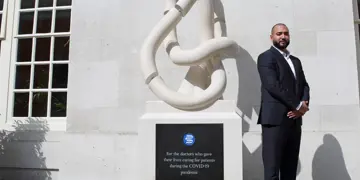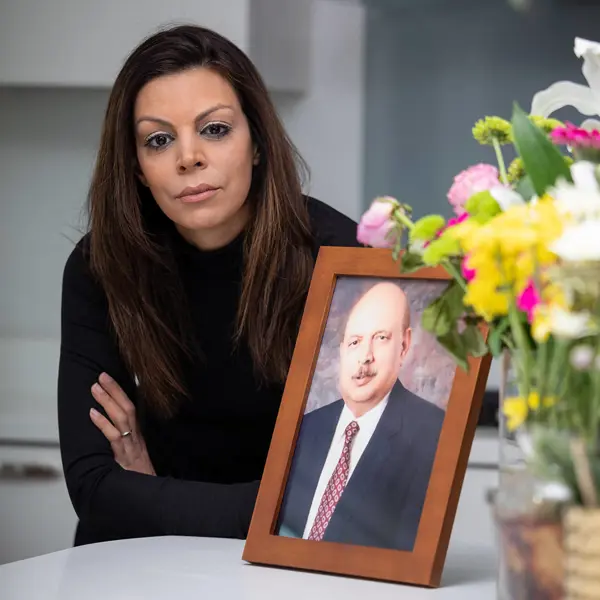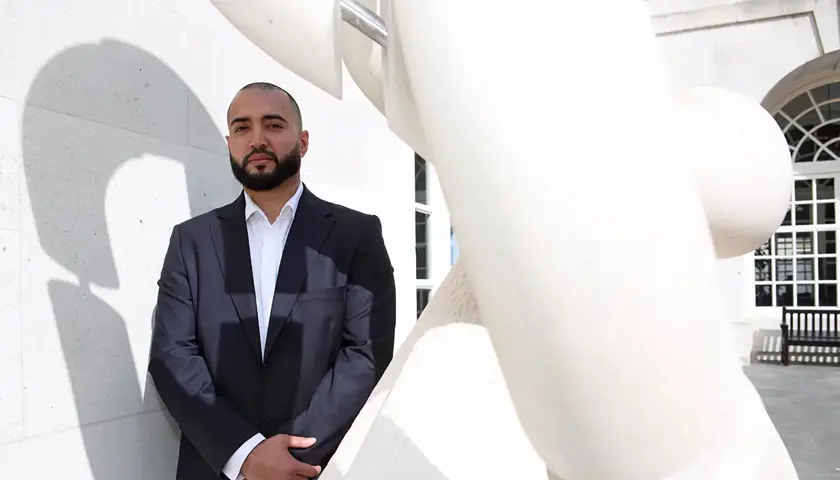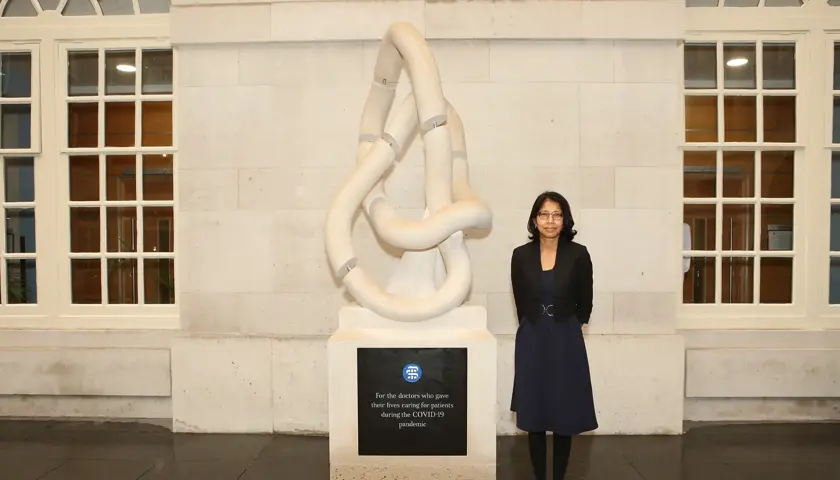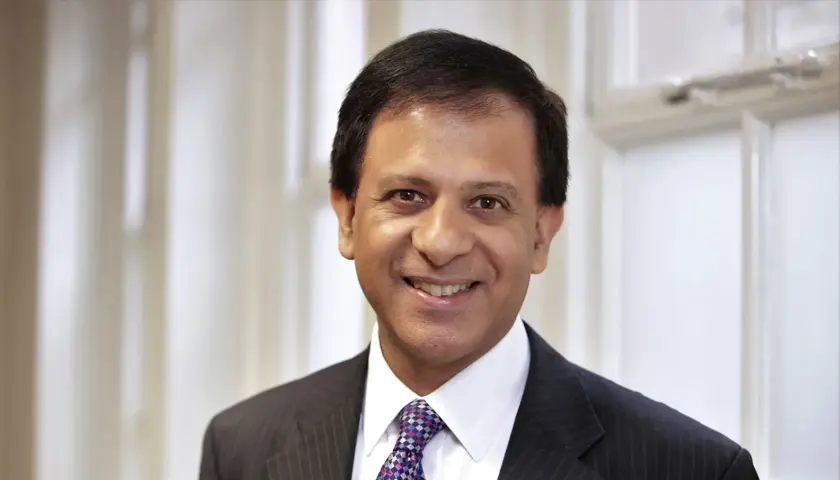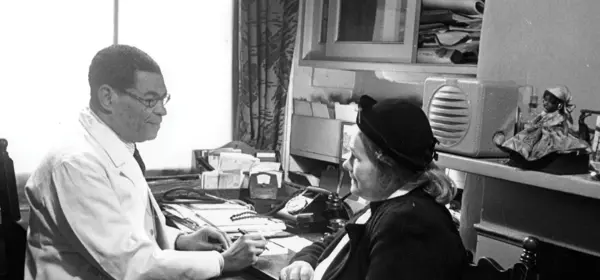Remembering them: the doctors who died fighting COVID
Remembering them: the doctors who died fighting COVID
Forty-nine UK doctors are known to have lost their lives to COVID, having toiled selflessly for their patients in the face of the pandemic. As a new memorial is unveiled at BMA House in London, Tim Tonkin speaks to the families of some of the departed
Pamela Foley recalls well the ‘incredibly unlikely circumstances’ under which she and her future husband Amged El-Hawrani first met each other in June 1988.
Having missed their bus home, Pamela and a friend had decided to hitch-hike. The car that eventually picked them up was being driven by Amged, then a medical student at the Royal College of Surgeons in Dublin, and a friend.
‘They were on their way to purchase frogs for dissection purposes,’ says Pamela. ‘They stopped to ask us directions and they ended up giving us a lift the whole way home many miles in the opposite direction of where they were actually going to, and that’s how we met.’
After marrying, travelling and living in different parts of the world together, Amged, Pamela and their son Ashraf settled and built their lives in Staffordshire, close to where Amged worked as a consultant in otolaryngology at the University Hospitals of Derby and Burton.
Then on 28 March 2020 Amged’s life, a life that had centred upon his family and the quiet acts of heroism in his career, tragically came to an end at just 55 years of age following a short battle against COVID-19. One of 49 doctors across the UK to date known to have lost their lives to the virus, Amged’s name and life was among those honoured and commemorated by the BMA at a special memorial service in London on 16 March this year.
These people died in the line of duty and should be forever admired as the heroes they are
Pamela Foley
Attending the event with Ashraf and Amged’s brother Amal, Pamela says the memorial was deeply important to her, in large part because of the restrictions that had been imposed on hospitals during the first lockdown.
‘Amged passed away in the very early stages of the pandemic, so we couldn’t be by his side through his time of illness,’ she says.
‘The restrictions also meant we couldn’t conduct an appropriate funeral. The absence of a funeral deprived Amged of the remembrance he deserved and denied our family the chance to communally honour his name.
‘I feel this memorial exists as a crucial opportunity for us to acknowledge the selfless nature of the health workers who lost their lives in the battle against COVID. These people died in the line of duty and should be forever admired as the heroes they are.
‘I also feel that this memorial allows me and my family to reclaim part of the experience we lost, when we were prohibited from a traditional funeral and memorial service.’
Hardworking and adventurous
Born in Khartoum, Sudan, Amged El-Hawrani’s family moved to the UK when he was a boy after his father, a doctor, landed a job in the NHS, with Amged ultimately deciding to follow in his father’s footsteps.
After completing his studies in Ireland, Amged trained in hospitals in Wales and the Midlands as well as spending five years training in Scotland and, in 2004, taking a fellowship at Stollery Children’s Hospital Edmonton in Canada. While incredibly hardworking and dedicated to his professional life, Amged also had an adventurous side.
In 2010 he took part in an expedition to Mount Everest in an effort to raise funds for a new CT scanner at Queen’s Hospital, Burton. In the months following Amged’s death, dozens of his former patients wrote to Pamela expressing their condolences.
One patient mentioned how Amged had once relayed to them the story of how he had met Pamela, and how he had told them that, on a day when he had been looking for frogs, he had ended up ‘finding his princess’.
‘I’m completely overwhelmed by some of the things that patients have said about him in letters, about how he has saved so many lives,’ explains Pamela.
‘To save a single life a is feat that will forever be respected. The requirement of Amged’s role led to saving lives on a consistent basis.
‘Amged lived his whole life treating everyone with kindness. He wanted to fix everything and everybody, whether it was physically or mentally. Praise and approval were meaningless to him, he was only gratified through witnessing the result his input had on the people he cared for, both professionally and as a husband, father, brother, son and friend.’
Loved and respected
Syed Habib Haider Zaidi had been a GP in Leigh-on-Sea in Essex for more than 45 years having worked for the NHS for more than 50 years.
Although his original dream had been to become a surgeon, he chose to pursue a career in general practice to focus on his growing family. As such, he threw himself into becoming a GP, first working on a salaried basis before eventually partnering a three-site practice consisting of more than 17,000 patients along with his wife, Syeda Talat Zaidi. Alongside running their practice, the pair also raised four children, all of whom ultimately went on to work as NHS doctors or dentists.
Dr Zaidi, who was 76, passed away in hospital after contracting COVID in March 2020. His daughter Zehra, who is a GP herself, explains how she had grown up watching the respect in which her parents were held by their local community.
‘My dad was ultimately a really helpful person just in life in general, he would always help people and was selfless in so many ways,’ she says. ‘He would go out on Christmas Day in the middle of Christmas dinner, and deliver someone’s baby, or he would go and see a sick child.
‘People would stop him in a supermarket, or whilst out locally all the time. I can remember one old lady saying thank you for fixing my knee. He loved helping people [and] people genuinely loved him, he was a community person.’
He would always help people and was selfless in so many ways
Zehra Zaidi
Zehra explains how her father had used his business skills to fund the building of a primary care endoscopy unit, to allow surgeons from the hospital to come and do colonoscopies and gastroscopies on cancer patients, thus relieving pressure on existing NHS secondary care services in the area.
She says that, since his passing, she had sought to avoid feelings of anger or resentment about his death, on the grounds that she felt such emotions would stifle her and her family’s ability to heal.
She notes, however, that not being able to be with her dad in his last days because of the strict health restrictions in place during the first lockdown, has been very hard to take.
‘I couldn’t even travel to see him because the hospital wasn’t letting anyone in, even if you were on ITUs or were ventilated.
‘He worked really hard, probably to his detriment, because he was working till he died. He never had a day off, he never retired [and] he never got to do any of the things they should have done [and] gave so much to the NHS. ‘He was a great man, a great family doctor and the most generous and loving individual I have ever known, constantly putting his own needs beneath those of others and we all miss him immensely.’
Family man
Yusuf Patel came to the UK from Malawi in the 1960s as a seven-year-old boy. The son of Indian parents, he became the first doctor in his family, graduating from Sheffield medical school in 1984, before going on to forge a career in general practice in East London, where he founded the Woodgrange Medical Practice in Forest Gate.
Dr Patel’s hard work and dedication eventually saw his surgery receive an outstanding rating from the Care Quality Commission in 2017. As well as being a full-time GP partner, he was also a committed family man who doted on his wife and three children, while also caring for his mother who suffered from dementia.
When news of COVID-19 first began to reach the UK in early 2020, Dr Patel tried to do everything he could to prepare for an uncertain and foreboding near future.
‘He was sending out messages to everyone and phoning friends and relatives, warning them to be cautious,’ says Dr Patel’s son Ahmed. ‘He was going into work “unarmoured”, but he still wanted to be part of the [response] plan and he was still there making plans about how they were going to react [to the virus].’
In life he sacrificed a lot of himself for others, that was his nature... he didn’t have any airs or graces about him
Ahmed Patel
Falling ill shortly after the announcement of the first national lockdown, Yusuf immediately self-isolated before later being admitted to hospital.
He passed away on 20 April 2020, 10 days after having been placed on a ventilator. The level of respect and gratitude felt towards him in his local community was demonstrated when a charitable fundraiser set up to continue his legacy saw more than £30,000 donated.
Describing his father as a pioneer within his family and community, Ahmed says that, as remarkable as his achievements were, his dad had been one of the most humble and down-to-earth individuals he had ever known.
‘I think he always wanted to be a family-orientated doctor [and] he had always aspired to open up his own surgery and provide the best possible care for patients,’ says Ahmed.
‘He bought a property – it was literally a derelict bank – and he built it from scratch, starting from a small number of patients to over 16,000 patients as of today.
‘He was very business minded, very sharp, but also had a very generous heart. He always cared for his friends, his relatives and treated his staff like family. He gave opportunities to staff offering partnerships to people, who were 10 to 20 years younger than him which is pretty unheard of.
‘In life he sacrificed a lot of himself for others, that was his nature. He could talk to young people, old people, educated or uneducated, he didn’t have any airs or graces about him.’
Nature lover
Consultant paediatrician Liza Harry describes how she met her future husband Shree Vishna Rasiah nearly 20 years ago while they were working at Jessop Wing, the maternity and neonatal hospital in Sheffield.
Known as ‘Vish’ to his family, friends and colleagues, Dr Rasiah had been born in Malaysia and after completing his primary medical qualification in Australia, had come to the UK to further his studies.
After completing his training at Sheffield, Vish went on to take a research role then a post as a consultant neonatologist in Birmingham. As well as his consultant role, he became the clinical lead for the Southern West Midlands maternity and newborn network.
Vish and Liza married in 2005 and later settled together in Worcester where their daughter Katelyn was born.
Outside of medicine, Dr Harry says her husband was passionate about the natural world and was also a keen photographer. He was the unofficial designated photographer at work and would take pictures of and for the team whenever there was a celebration or important event on the neonatal unit.
In early 2020, as the shadow of COVID lengthened across the globe, Dr Harry explains that her husband seemed increasingly frustrated by the UK Government’s slow response to the looming crisis.
‘I remember when all the reports were coming out about what was happening in Italy, he was apprehensive that we would be in a similar position within a fortnight or less here in the UK,’ she says.
‘He was frustrated at the slowness of the response. I remember he said in early March that he didn’t understand why more wasn’t being done.’ After falling ill in mid-March 2020, Vish was admitted to hospital on the 25th of that month, before being transferred to the ICU two days later.
Dr Rasiah died on 23 April 2020. Dr Harry says her husband’s passing has left an ‘indescribable void’ in her and her daughter’s lives.
Having attended the special memorial event at BMA House last month, Dr Harry says that such remembrances are so important.
‘I would like Vish to be remembered for his dedication and his humility and selflessness. And his commitment not only to always putting his patients first, but to training the junior doctors he came into contact with to work to the same high standard,’ she says.
‘It means very much for him to be remembered officially in the way that the ceremony [at BMA House] did, because it means that people are hearing his name and his memory is being kept alive.
‘Anytime that he is remembered and honoured is painful but it is also comforting in a way to know that many others remember as well.’
Courage and bravery
A stone memorial now resides in the central courtyard of BMA House, designed to serve as an enduring symbol of respect and remembrance in honour of every doctor who lost their lives during the pandemic.
The extent of their sacrifice was a source of solemn reflection for BMA council chair Chaand Nagpaul who, in his address to last month’s memorial event, emphasised that the courage and selflessness of every healthcare professional during the early days of the pandemic would be remembered for years to come.
He said: ‘It is important to reflect on those first few weeks to understand the depths of courage and bravery that our colleagues displayed.
‘There was no guarantee of personal safety, amidst shortages of protective equipment, with no vaccination or effective therapeutics. For thousands of doctors, nurses, healthcare professionals and support staff there was only the front line.
‘It is a cruel tragedy that, in saving the lives of tens of thousands of patients, so many doctors lost their own. They dedicated their lives to the pursuit of helping others. Their deeds will inspire generations long after this pandemic has passed.’
- Until September 2024, resident doctors were referred to as ‘junior doctors’ by the BMA. Articles written prior to this date reflect the terminology then in use


